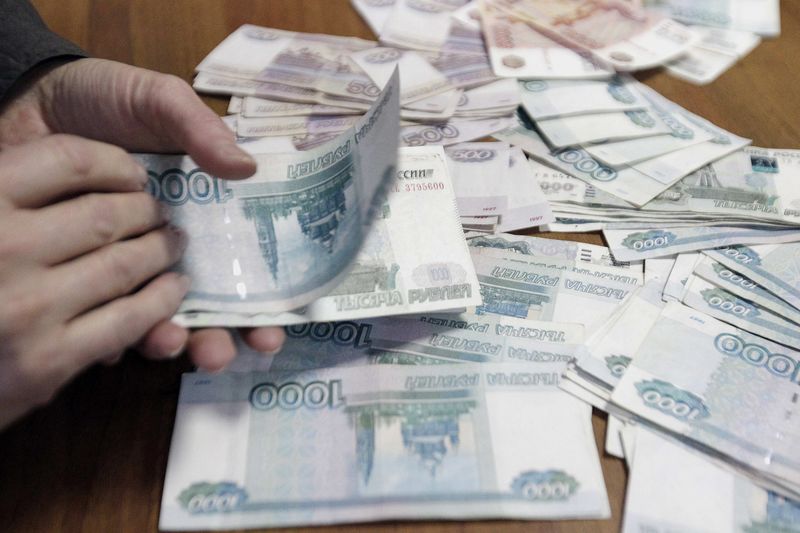By Sujata Rao
LONDON (Reuters) - Russia's credit rating looks set to tumble into junk for the first time in more than a decade, a move that would exclude its bonds from a couple of high-profile indexes and may set off another wave of capital outflows.
The Fitch agency cut its rating on Russia to 'BBB minus' from 'BBB' on Friday, citing a significant deterioration in the country's economic outlook due to the slump in oil prices and falling value of the rouble.
That is still investment grade, the category that implies low default risk, but only one notch away from so-called junk, the grade Russia rose out of in 2004.
Bigger rival Standard & Poor's has Russia already at 'BBB minus', with a negative outlook, meaning the next move will likely push it into junk. It says it will review the rating in mid-January and again in April.
"A downgrade to junk for Russia...is a foregone conclusion," said Hung Tran, executive managing director at global industry body, the Institute of International Finance.
A fall to junk will deal a blow both to Russia's already-battered economic prospects and to its image as a global power. Peers in the BRICS group of big world economies - China, India, Brazil and South Africa - are all rated investment grade.
Markets are already pricing Russia as junk, according to bond yields and debt insurance costs, and as this graphic shows. (http://link.reuters.com/zaw82w)
While that should cap capital outflows from the move itself, knee-jerk losses are still likely.
Many conservative funds are barred from buying sub-investment grade securities, so loss of this coveted rating can trigger selling of existing securities and raises future borrowing costs for a country and its companies.
S&P last month placed the country on "Creditwatch Negative", implying a 50 percent chance of a downgrade in the next three months. Its own "market derived" score for Russia indicates a rating five notches below current levels.
Moody's rates Russia two notches above junk but with a negative outlook, and is expected to follow S&P later in 2015.
Western sanctions imposed over Moscow's role in the Ukraine crisis and oil's price collapse are tipping Russia's economy into recession, while central bank reserves have fallen by more than $100 billion - unlike during the 2008 crisis, reserve volumes fall short of total debt.
"We expect Russia to fall from the investment grade category by March or early April," Societe Generale strategist Regis Chatellier said, predicting some forced selling of Russian debt.
Russian officials were unavailable for comment due to the country's extended New Year break but Finance Minister Anton Siluanov said late last month the dangers were "exaggerated".
"We are working (with rating agencies) and explaining the economic situation," he told reporters. "It seems to me that foreign understanding doesn't always correspond to what is actually the case."
An oil price bounce or a lifting of sanctions could bring respite. But Moody's said on Dec. 22 it expected "limited upward pressure on ratings", while predicting downward moves if oil prices stayed at "current levels".
Since then, crude futures have tumbled another $10 a barrel.
OUTFLOWS, INDEXES
The biggest impact would be felt with both Moody's and S&P cutting Russia to junk because that would lead to the country's ejection from Barclays (LONDON:BARC)' Global Aggregate index that is estimated to be have $2 trillion benchmarked against it worldwide.
Adding in sovereign and corporate debt in roubles and hard currency, Russia has a 0.7 percent weight that Barclays reckons amounts to $140 billion.
Dedicated emerging market funds would be less affected because most EM indexes include non-investment grade credits. But JPMorgan said Russia could be removed from the investment-grade portion of its GBI-EM index for emerging currency bonds, a portion to which around $5-7 billion is benchmarked.
A lot of foreign funds, including those following the Barclays index, have already dumped their Russian holdings and the cost of insuring Russia exposure via credit default swaps (CDS) exceeds that of Pakistan and Lebanon whose ratings are deep in junk.
"Russian credit is already priced for three downgrades. However if you do get an actual downgrade to high-yield, you do get some more capitulation," said David Hauner, head of EEMEA debt and strategy at Bank of America/Merrill Lynch.
A BofA/Merrill study comparing CDS spreads and ratings found that a one-notch downgrade to junk tends to fuel a 40-60 basis point increase in bond and CDS spreads.
Russian sovereign debt yields 630 basis points above U.S. Treasuries <11EML>, close to Iraqi and Angolan levels. That is 400 bps above year-ago levels and more than double the average premium paid by other investment grade credits on the EMBIG index.
"There is always some reaction (to loss of investment grade)" said David Spegel, head of emerging debt at BNP Paribas. "Some people hold on and ignore events until they find their IG credit is now junk, and they must get rid of it."
A downgrade will be most problematic for companies whose spiralling borrowing costs - reflected in a doubling of bond spreads since January 2014 - may rise even further <.JPMCRUS>
About $100 billion in company debt is due this year.
"A potential downgrade could intensify the pressure on Russian corporate bonds, not so much due to the downgrade itself but due to further restrictions on bond holdings stemming from institutional investors," SocGen's Chatellier said.

(Graphics by Vincent Flasseur; additional reporting by Jason Bush in Moscow; editing by Philippa Fletcher) 2015-01-11T093731Z_1_LYNXMPEB0A032_RTROPTP_1_RUSSIA-CRISIS-MARKETS.JPG urn:newsml:onlinereport.com:20150111:nRTROPT20150111093731LYNXMPEB0A032 File photo of an employee of a local company counting Russian rouble banknotes in Stavropol OLGBBUS Reuters UK Online Report Business News 20150111T093731+0000 20150111T093731+0000